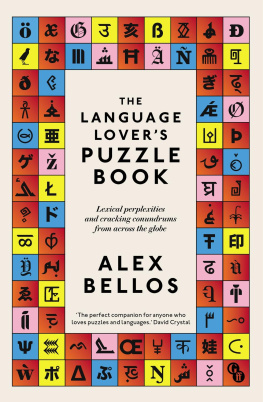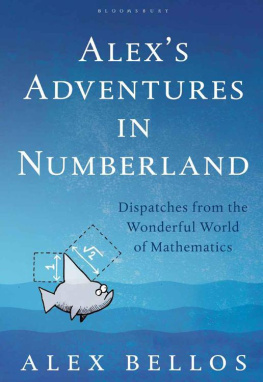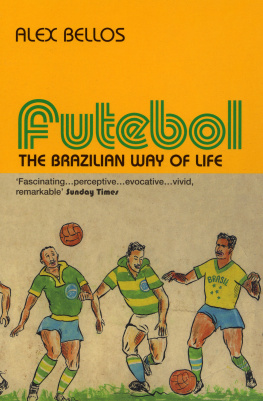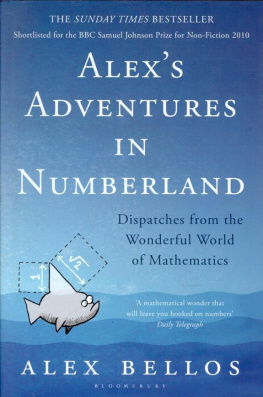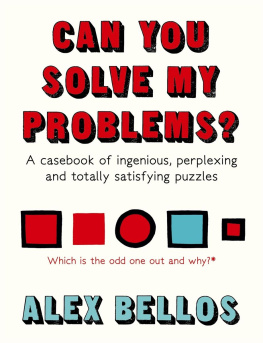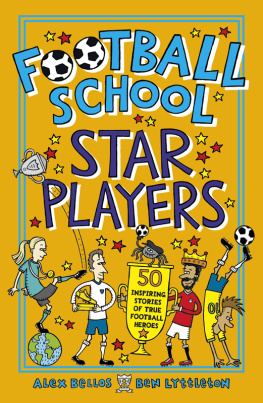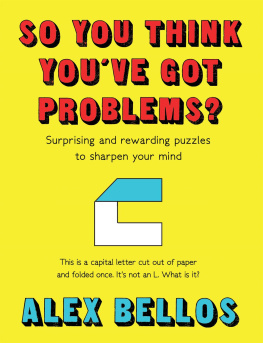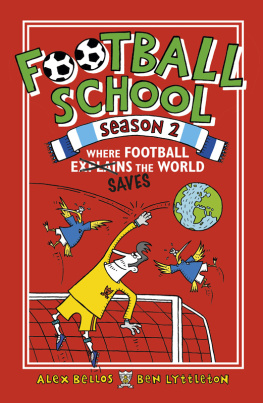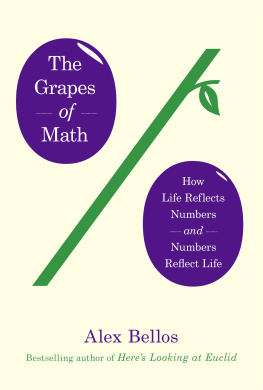Alex Bellos - The Language Lovers Puzzle Book: Lexical Complexities and Cracking Conundrums from Across the Globe
Here you can read online Alex Bellos - The Language Lovers Puzzle Book: Lexical Complexities and Cracking Conundrums from Across the Globe full text of the book (entire story) in english for free. Download pdf and epub, get meaning, cover and reviews about this ebook. year: 2020, publisher: Faber and Faber, genre: Children. Description of the work, (preface) as well as reviews are available. Best literature library LitArk.com created for fans of good reading and offers a wide selection of genres:
Romance novel
Science fiction
Adventure
Detective
Science
History
Home and family
Prose
Art
Politics
Computer
Non-fiction
Religion
Business
Children
Humor
Choose a favorite category and find really read worthwhile books. Enjoy immersion in the world of imagination, feel the emotions of the characters or learn something new for yourself, make an fascinating discovery.
- Book:The Language Lovers Puzzle Book: Lexical Complexities and Cracking Conundrums from Across the Globe
- Author:
- Publisher:Faber and Faber
- Genre:
- Year:2020
- Rating:5 / 5
- Favourites:Add to favourites
- Your mark:
- 100
- 1
- 2
- 3
- 4
- 5
The Language Lovers Puzzle Book: Lexical Complexities and Cracking Conundrums from Across the Globe: summary, description and annotation
We offer to read an annotation, description, summary or preface (depends on what the author of the book "The Language Lovers Puzzle Book: Lexical Complexities and Cracking Conundrums from Across the Globe" wrote himself). If you haven't found the necessary information about the book — write in the comments, we will try to find it.
The Language Lovers Puzzle Book: Lexical Complexities and Cracking Conundrums from Across the Globe — read online for free the complete book (whole text) full work
Below is the text of the book, divided by pages. System saving the place of the last page read, allows you to conveniently read the book "The Language Lovers Puzzle Book: Lexical Complexities and Cracking Conundrums from Across the Globe" online for free, without having to search again every time where you left off. Put a bookmark, and you can go to the page where you finished reading at any time.
Font size:
Interval:
Bookmark:

To my polyglot parents
My name is Alex and Im a language lover.
Im also a puzzle person. You could call me a conundrum connoisseur. Indeed, for the last five years Ive been writing a puzzle column in the Guardian. What I love about puzzles is the way they provide a double hit: they present a fun challenge, while opening your eyes to something new. A good puzzle gives you the thrill of achievement and the joy of discovery at the same time.
The brainteasers in this book celebrate language, and languages. You will find enigmas about English, a riddle about Rarotonga, and a stumper about stenography, as well as dozens of other problems about exotic tongues and mysterious alphabets. Youll decipher Egyptian hieroglyphs, translate puns from Dutch, and deduce the days of the week in Swahili. You will learn how to count in Manx, how to write in Chinese, and how to speak in silence to an eleventh-century monk. Each puzzle reveals something curious about language, about culture, or about science. Most of it will be new to you.
Heres an example, to give you an idea of what to expect.
*
The following eight phrases are in Japanese, transcribed into the Latin alphabet:
| boru niko | two balls | ashi gohon | five legs |
| tsuna nihon | two ropes | ringo goko | five apples |
| uma nito | two horses | sara gomai | five plates |
| kami nimai | two sheets of paper | kaba goto | five hippos |
What is the Japanese for nine cucumbers?
a) kyuri kyuhon c) kyuri kyuhiki
b) kyuri kyuko d) kyuri kyuto
Think about it for a while. Well get to the solution soon enough. But you can already see that Japanese speakers do not count objects the way we do.
*
In 1965, academics at Moscow State University organised a competition that aimed to get secondary school students excited about languages. It was modelled on the mathematical olympiad, a maths competition that was attracting many young students to the subject. The linguistics olympiad consisted of brainteasers about language and languages that were intended to be fun, enticing, and curious. These contests have since inspired linguists around the world to start their own competitions using similar types of questions. The UK Linguistics Olympiad was inaugurated in 2010.
Two years ago, a reader of my Guardian column tipped me off about the linguistics olympiads. I was entranced! The problems blew my mind. They were beautiful and varied, twisting my brain in ways it had never been twisted before. At the same time, they transported me across the world and introduced me to languages and writing systems that I had never even heard of. When I published some of these puzzles in my column, my readers loved them too.
This book is a compilation of my favourite olympiad problems. They assume zero knowledge of linguistics, and no competence in a language other than English. They can be solved with a mixture of mathematical reasoning, linguistic intuition, out-of-the-box thinking and bits of general knowledge. If youve ever solved a Sudoku, completed a crossword, or scrutinsed a Scrabble board, then these puzzles will get your juices flowing.
*
Around 7,000 languages are currently spoken in the world. You will encounter more than 50 of them in the following pages. Ive also included problems about more than a dozen ancient tongues, and several invented languages.
Many of the puzzles are code-breaking challenges in which your task is to deduce what is interesting, or unusual, about the language in question. The easier ones concern languages similar to English. The further from English we get, the harder the problems become. Ive chosen indigenous languages from every continent (except Antarctica, which doesnt have any) that display all sorts of phenomena, to showcase, as much as I can, the amazing linguistic diversity in the world. The puzzles require you to process the language in your head, so they also give you the thrill of thinking the way that speakers of that language do. For a moment you leave your couch for ancient Babylon, or Papua New Guinea, or Timbuktu.
Several puzzles introduce unfamiliar alphabets and writing systems. There is something magical about looking at a script you cannot read, and then trying to decipher it. At first, all you see is the elegance of the shapes, artistic expressions of a culture that is not your own. Gradually, patterns reveal themselves. The puzzles I have included give you just enough information to decipher them. The joyous moment when it all fits together is an echo, perhaps, of the moment you learned to read as a child.
Ive arranged the puzzles by theme, and provided context and background that tell wider stories, such as the development of writing, the evolution of English, the birth of numerical notation and the history of invented languages. We will meet incredible people, such as Sequoyah, the Native American who invented a writing system despite not being able to read, and Louis Braille, who devised his tactile alphabet for blind people when he was only 15 years old. I will explore how the study of language and its connections with geography, history, sociology and psychology contributes to a deeper understanding of the human experience.
Our travels take us back in time and around the world. They also take us to the future. Linguistics has always been a poor relation among the sciences, lacking the romance of, say, astrophysics, the fashionableness of genetics, or the nerd cool of pure maths. Yet the field is perhaps at the most exciting and relevant point it has ever been, thanks to the growth of language-based tech such as voice-recognition, machine translation and natural language processing. The next great leaps in AI will rely on breakthroughs in our understanding of language.
The book begins with a chapter on language and technology. Well have fun with Google searches, internet slang and some extremely efremious bots. (Youll understand what I mean when we get there.) The problems in the first chapter are almost all in English, which means they provide something of a warm-up for the rest of the book. Well get into the swing of discovering how languages work by looking at our own language, before venturing further afield.
The puzzles are not presented in order of difficulty. Some are particularly fiendish, because they require your brain to work in unfamiliar ways. Once you know the answer, of course, the hardest problems turn out to be almost trivially easy. Languages are designed for communication, not obfuscation, even if to non-speakers they can appear convoluted or complex. I include problems about languages that were invented deliberately to be as simple as possible, and these are some of the toughest puzzles in the book! (Before each chapter I also include some quick-fire questions to get you in the mood.)
*
Now back to those Japanese cucumbers. Lets solve the problem slice by slice.
Cast your eyes across the Japanese and English words. The most noticeable pattern is that the English phrases all have the word two in them, but the Japanese phrases share no repeated whole word. We can deduce that two has no exact translation in Japanese. Likewise, from the second list we can deduce that five has no exact translation either.
Yet the Japanese phrases do exhibit some kind of pattern. Looking closely, we can see that the element ni- is repeated in every phrase in the first list, and the element
Font size:
Interval:
Bookmark:
Similar books «The Language Lovers Puzzle Book: Lexical Complexities and Cracking Conundrums from Across the Globe»
Look at similar books to The Language Lovers Puzzle Book: Lexical Complexities and Cracking Conundrums from Across the Globe. We have selected literature similar in name and meaning in the hope of providing readers with more options to find new, interesting, not yet read works.
Discussion, reviews of the book The Language Lovers Puzzle Book: Lexical Complexities and Cracking Conundrums from Across the Globe and just readers' own opinions. Leave your comments, write what you think about the work, its meaning or the main characters. Specify what exactly you liked and what you didn't like, and why you think so.

